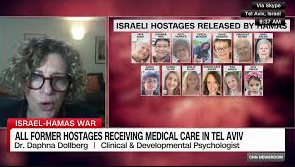Israeli Psychiatrist Describes Extreme Abuse Suffered During Captivity
Many hostages released by Hamas in November continue to require intensive psychological treatment due to the trauma endured during their captivity, according to Dr. Renana Eitan, head of psychiatry at Ichilov Tel Aviv Medical Center.
Eitan stated that among the 14 hostages treated at her facility, including children, many had suffered extreme physical and mental abuse. Some were drugged with ketamine, subjected to or witnessed sexual violence, confined in tiny cages, or left in total darkness for days. She described their suffering as the worst she has encountered in her career.
Despite initial joy during reunions with families, many hostages soon exhibited severe psychological distress, including nightmares, intrusive memories, dissociation, and intense fear. Of the 14 hostages under Eitan’s care, nine are minors, with two under the age of 10. Six remain in intensive psychiatric treatment, while others have been transferred to different facilities across Israel.
Eitan warned that while the public saw emotional reunions, the hidden reality is that these individuals face a long and difficult road to recovery.



Leave a Reply